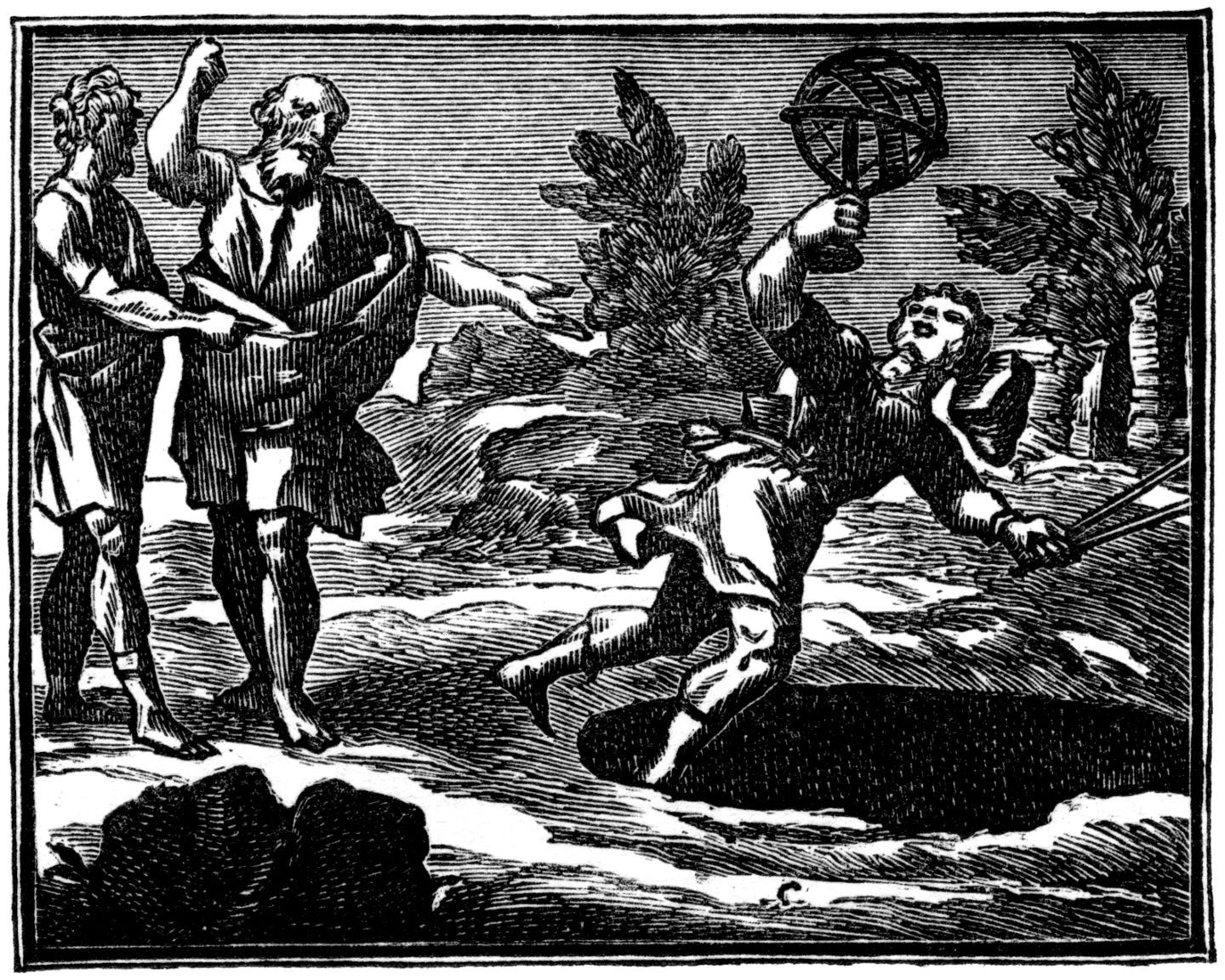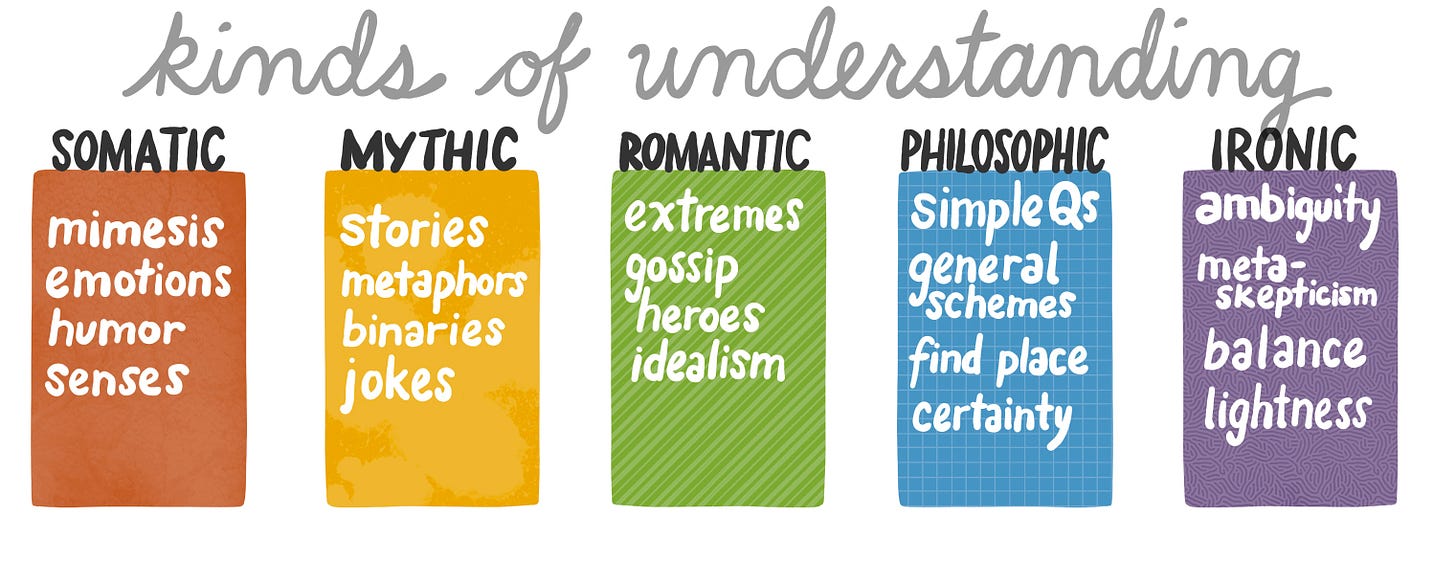A young man steps out of a time machine. “I’ve traveled here from your future,” he announces loudly, “to tell you something important.” You note that he’s wearing a letter jacket reading Egan High School — Class of 2036.

“It failed. The whole Egan-education thing — you all tried it, and… it all went so, so wrong.”
The setup
In a post two weeks ago I set up this scenario and issued a challenge: imagine ways Egan education could go wrong. And great galactic guacamole did you come up with them!
To all those who participated: thank you for your service.
Initially, I had planned to compile, summarize, and reply to all sixteen-or-so of them in this weekend’s post. Hours into compiling them, I thought, eh, I’ll just do half this week. An hour into responding, I realized I could just get to one of them.
This, um, takes longer to do than I had anticipated. This week, I’ll share the very first one, and I’ll work through the others soonish-ly.
In this post, after I work through the very first one, I’ll
share the list of all the ways we came up with
award the winner (because why wait?), and
sketch out some thoughts on where we might go with these.
Imaginary Interlocutor: Why did you choose the one in this post to go first? What order are these going to be in, anyway?
I grouped all the failure scenarios into three categories:
ones in which Egan’s method worked so well, it sowed the seeds of its own destruction
ones in which Egan’s method was dead on arrival
ones in which failure was some irritating mixture of the two
I decided to start with scenarios from the first box, because I thought it’d be dramatic to build to the darker ones.
Scenario #1: Everyone hates philosophers
This was raised by
(boldface mind):Students succeed, parents don't like the result. A lot of alternative schools emphasize they still leave students prepared to succeed by conventional metrics (e.g. unschoolers do ok on standardized tests! this homeschooler got into Ivy League schools!). Egan's methods seem like they create learners with a taste for something other than what's on offer in the standard track, so students might "let down" their parents by stepping of the conventional success track (and it's easier for parents to say they don't care about that before it's a real concern).
My distillation:1
Maybe our Egan school works wonders, and shapes adults who love philosophy… and drop out of society, develop a serious addiction to Hegel, disappoint their parents, and generally serve as a warning sign against children enrolling in our school.
My thoughts:
A couple of things, here.
First, I think some folks have a misconception that Egan’s ideal of “Every person should become a philosopher!” means we’re trying to help kids become goatee-stroking, clove-smoking post-docs who’ll never make more than minimum wage.
We’re, um, not trying to do that.
In the way that Egan is talking about philosophy, everyone can fall in love with it and stay on something like the conventional success track, because to Egan “philosopher” doesn’t mean “absent-minded person who sees no value in the workaday world and while contemplating the heavens falls into a well”, but rather something closer to “someone who thinks about the big picture, how everything connects to everything, so as to live in the world better.”
Understood like this, you certainly want (say) your doctor to be a philosopher — to be able to step out of mindlessly checking off boxes and following routines when you’re showing her your symptoms, able to understand the purposes for which those boxes and routines were set up. And you want your electrician to be a philosopher, and so on. Everybody living the life of the mind means a better society for everyone.
Second, though, I think that other folk have a misconception that philosophy never makes people useless to their societies. The philosopher falling down a well is a stereotype for a reason.
Egan, I think, was aware of this — it’s why his final kind of understanding isn’t “Philosophic”. Rather, it’s “Ironic”: when you recognize (among other things) that the life of the mind promises more than it delivers, and anchor yourself to the world.
I’ll admit that I first thought that Leah’s fail scenario was unlikely… until I remembered that I’d read somewhere about something like this actually being a problem in conservative Catholic communities, among young men, especially. (Was it something that Rod Dreher wrote a few years ago? I’m not sure.)2
How can we de-risk this before we begin?
Well, I think we can get all Cal-Newport / 80,000-Hours on this.
Cal Newport is now a professor of computer science, but got his first book deal when he was an undergraduate. His book So Good They Can’t Ignore You challenges the whole ️🌈 follow your passion! 🦄 advice my generation imbibed, and replaces it with evidence-backed advice on how to build valuable skills to get the career you want.3
80,000 Hours is a nonprofit that give adults (often young adults) guidance on how to use their career choices to help solve the world’s most pressing problems. They’re part of the Effective Altruism movement, and have written a very bingeable book of their foundational advice.
Anyhoo: I think we can draw from both of these approaches as we design Egan-fueled high school curriculums.
That is, instead of crossing our fingers and wishing that our graduates will become productive members of society, we take a simple question:
how could you play a part in helping mend the world?
and bake it into our high school curriculum.
I.I.: Are you saying we should compromise with society, sully Egan’s pure method, and waste time on useful stuff?
See, um, that response suggests that maybe it’s important that we do this. Let’s repeat our mantra:
Egan isn’t enough.
There’s no such thing as pure Eganism. There can be no such thing as pure Eganism, because (unlike, say, Maria Montessori) he never set out a full curriculum.4
But I think that a focus of helping high schoolers think through how they can help mend the world through building a career can fit fairly nicely into the vision Egan laid out.
Detailing how we might incorporate this into the high school curriculum will take some time — and I’ll first need to write some other posts to give it context. But for the moment, I’ll just note four interesting overlaps:
First, in an Egan middle-school history curriculum, we’re already going to see many examples of people who’ve tried to mend the world — some of whom succeeded, and some of whom aided wars and genocides. In an Egan high-school history curriculum, we’re going to spend a lot of time trying to figure out what’s really good and bad in society, and what really causes change.
So: we don’t need extra time to do this; it’s already included.
Second, part of Romantic Understanding is the pull toward idealism; part of Philosophic Understanding is seeing that (dang it all) you’re enmeshed in complex systems that you can’t simply step outside of, and you need to be thoughtful about how you try to mend the world.
So: this is sort of already Egan’s plan, sort of. I think. Partially.
Third, “I want to use what I’m learning to help mend the world” can give new motivation for doing hard academic work and building skills. (Sometimes, too much — epic goals are a heckuva drug.5)
So: this might not take away focus; rather, it might add to it.
Finally, Newport’s second book — which has perhaps the most embarrassing title I’ve ever heard of — actually builds a platform for beginning the process of thinking seriously about building a meaningful career… all the way back in high school! And one major plank of it looks oddly like Egan’s “Learning in Depth” program.
So: this might weirdly coincide with what we might already be doing.
(As a total aside, a program like this — that helps students connect their ideals to professional reality and that could be shown to work might be the best possible marketing Egan education could get.)
My final score:
How likely is this to become a big problem? I’d say 2 out of 5, if we don’t take steps to de-risk it ahead of time. If we do de-risk it, I’d say it could become one of our selling points.
How destructive do I think it would be, if it were a big problem? I’d say 2 out of 5, again.
I.I.: Are all the failure scenarios going to be so simple?
Ha! Yeah right. Just wait.
List of all the fail scenarios (so far)
As I compiled all the comments (and thanks to Aaron A. for helping me do that), here’s the list I came up with:
Box of Failures A: Egan education works so well, it sows the seeds of its destruction
Scenario #1: Nobody likes moral philosophers
Scenario #2: Kids go nuts!
Scenario #3: The school becomes an inflexible cult
Scenario #4: The movement splinters into warring factions
Box of Failures B: Egan education is dead on arrival
Scenario #5: This works, but not on standardized tests
Scenario #6: Our teachers, hired to do Egan, don’t!
Scenario #7: Nothing works, alles ist verloren
Box of Failures C: We fall into some irritating grey zone
Teacher-related ones
Scenario #8: We can’t find good teachers
Scenario #9: Teachers burn out
Student-related ones
Scenario #10: Egan’s method doesn’t scale to large groups
Scenario #11: New kids struggle to transition in
Culture-related ones
Scenario #12: We’re strangled by regulations
Scenario #13: School fails because of a culture clash
The approach itself
Scenario #14: We start in a situation where Egan can’t shine
Scenario #15: There are kids whom Egan doesn’t work for
A final category
Scenario #16: We put all our eggs into one basket
I.I.: Will you spend a whole post on each of these?
Oh, I hope to God that I don’t! But my track record on being brief in these posts is… less than perfect. And de-risking this project is serious stuff. So. We’ll see.
And the winner is…
I did promise to pick a winner — the person whose comments most helpfully imagined how an Egan school might fail!
So. Many. Great. Fails. (But I mean that, y’know, in the good sense.)
I could have picked any number of people — but the win this time goes to
, who has the substack The South Column! His fails (heh!) were many and of high quality. Hugo, I previously had no interest in Brazilian Freemasonry, but when you start posting stuff there, I’m interested to learn about it! (Maybe you’ll get some sort of future perk on this substack for winning? There’s 50–50 odds I’ll forget that you won,6 so if I say anything about perks, please remind me that you won this!)Posts coming up
Reading all those comments helped me understand better how people are understanding what I’ve been writing — and sketch out a bunch of posts that I think would be very useful for this still-inchoate movement.
Look for a post which lays out Egan’s “kinds of understanding” theory in a nutshell. Look forward to quite a few posts, too, on the very opposite of that — posts giving simple examples of what it can look like to Eganize a math lesson, a reading lesson, a history lesson, and so on. And look forward to a post which just plucks out what’s most exciting about what an Egan education can do — what people from diverse educational perspectives can love about his method.
And a final note
I mentioned last week that this little substack ain’t so little anymore — we’ve broken 1,000 subscribers! I also mentioned that, to help me mentally devote more time to writing this, I’m planning to turn on the “paid subscription” option, at $5/month.
I’ll turn that on next week. Next week I’ll also share my specific plans for what becoming a paid subscriber will get people (and how I’ll probably be using it). Right now I just want to share my incredulous thanks to the handful of people who “pledged” support ahead of time — far in excess of what I was going to ask for! Each of those, just, wow. To say that I’m honored doesn’t do it credit — I’m buoyed.
Um, everyone should probably expect my distillations for this series of posts to only 80% match what they actually wrote. That’s because some of the scenarios overlapped — a good sign — but a particular comment made me see a specific fail scenario, even if that was only implicit in the comment, or one of its side points. (It’s also because I’m an overblown person. Expect some of these scenarios to be overblown.) But I’ll always try to link back to the original comment! Everyone should free to note it if I’ve gotten your point wrong, but know that I’m doing my best to bring your wisdom to the community.
Leah (for those of you who don’t know) is deeply involved in building traditionalist Catholic community herself; I find her substack consistently challenging, and humane. Leah, if you’d like to share about any educational challenges you see in that community that you think this community might be in danger of replicating, I think I speak for all of us when I say we’d benefit from hearing it.
Well, evidenced-backed-ish. For a helpfully critical examination on how good his evidence is, check out the excellent review of it in the 2023 ACX book review contest. (Thanks to Jenn for putting all the reviews in one place; thanks to the never-de-anonymized review for writing it! If you know who you are, I’d love to trumpet you here.)
Scott Reasing, in his perspicacious comment, asks how Egan ends up solving what I christened (in part 1 of my book review) the “SAD triangle” problem. A full answer is forthcoming, but a partial one is this: Egan doesn’t move us out of the triangle, nothing can, and all teachers need to choose their position in it. However, Egan can somewhat take away the suckiness of combining corners (and can give each corner more oomf than it had before).
Speaking for a friend.
It’s me, not you. I have a terrible memory for details like “who won a contest I set up” and “into which lemonade glass did I pour that sulfuric acid”.







Thanks for the kind words! I do want to clarify my objection a little.
When I said you would succeed at teaching philosophy too well, I didn’t mean people would become Caricature Philosophers, who sit in armchairs and think all the time.
I meant they might be philosophers, consider how to live well, and come up with a very different answer their parents support or they meant school to teach (eg stepping off the prestigious career track to have children “too soon”, leaving their community to live among and serve the poor, etc).
The touchpoint is the Integrated Humanities Program at Kansas (https://en.m.wikipedia.org/wiki/Integrated_Humanities_Program), which was run by passionate Catholics but had a secular curriculum. The combination of interlinked humanities classes, stargazing and dancing, and the joy of their professors led to A LOT of conversations (and a lot of religious vocations).
The university investigated, didn’t find any evidence of proselytizing, but shut down the program because studying how to live wasn’t supposed to lead to so many people converging on an *answer*!
"I... I AM the banana king!"
Welp, right now I'm in the middle of transitioning my career, this will take about a year and a half, maybe two years. However, the perk I am interested in is better understanding all the tools you've been thinking of and manifesting, such as Science is WEIRD, the Deep Practice Book, and everything else. I want to study these tools and translate them (not literally, though maybe literally) to Brazil's reality and see what holds and what doesn't; learning is amazing and I don't know if this is a general human feeling or one that some of us have and others, don't.
Have you ever read that story where people come into contact with a society deeply affected by aesthetics, aesthetical perfection? It's an online short story, great one, very thought-provoking. I think that getting schools closer and closer to Egan (and Montessori, yes, I'm a huge fan, though I know it's imperfect) would unlock a new existence for humankind. To change schools is to change the whole expectations not only about childhood and education, but society itself, our purposes, our priorities! I don't know if it's possible, I know it's worth trying.
I honestly think my ideas for the pre-morten were not that insightful, but perhaps my comments showed that spark of love for this subject.
PS: As for Brazilian Freemasonry, heh, what can I say? I never sought to identify as a full-fledged Rationalist because I knew I am heretic from the start. But there is something to be discussed about a group of "free thinkers", that spawned the actual Illuminati, that may or may not have been transformed by the Rosicrucians, that proposed that growth is both personal and communitary, that has as one of its core tenets Truth.
PPS: Maria Montesori lived WWII in India, in the Theosophical Society ashram. Is that a tragic flaw of some unconventional thinkers, to be attracted to weird/false/questionable ideas? Is it essential? Is it accidental? I bet Egan had some pretty weird personal traits, too. Then again, Plato was a Pythagorean, Kepler and Brahe really liked their Astrology, and so on and so forth. What is UNSONG, if not Scott's drawing a circle around his Kabbalistic tendencies and saying, "stay there!"?